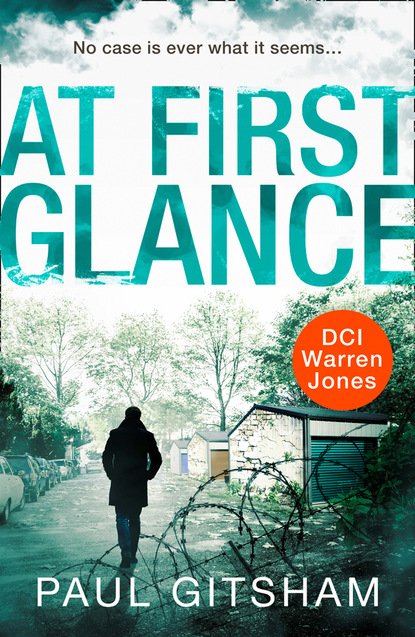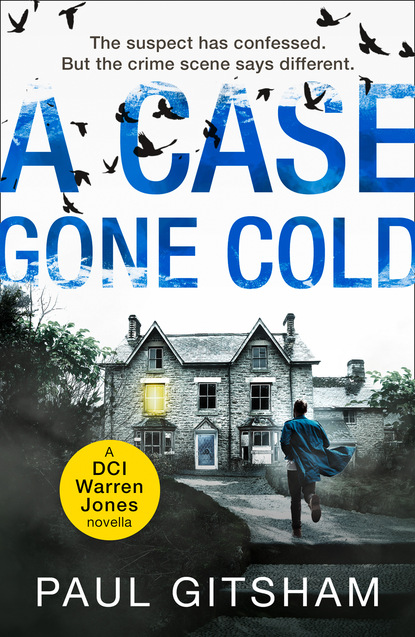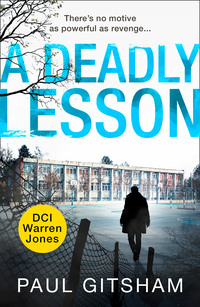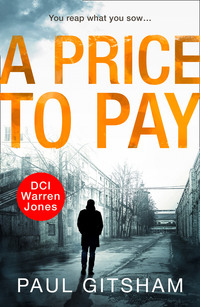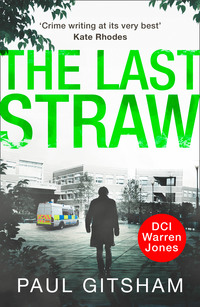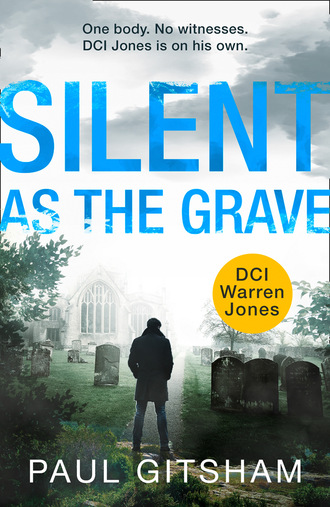
Полная версия
Silent As The Grave
“Preliminary cause of death is a stab wound to the chest. Cause of death for the dog is unknown. Initial analysis points to the victim being attacked on the pavement here—” Warren used the laser pointer to circumscribe an area of pavement on the photograph “—then dragged through tall grass into the edge of the woods and dumped out of sight under this bush.”
Warren cycled through a series of photos of the crime scene, highlighting the bloody trail and the body’s final resting place. “The victim’s pockets were empty, suggesting robbery as a possible motive. A leather wallet with his fingerprints and cards but no cash, was found in a litter bin about eighty metres from the dumping spot. However, forensics have been unable to identify any other prints.”
Warren paused. “It’s early days, but something doesn’t feel quite right. Our victim lived alone since his wife died three years ago yet we found no house or car keys on him. His niece, who reported him missing, went around to the house Sunday morning and found it locked. His car was still there, so the robbers didn’t steal it. She went in to the house and said that nothing was obviously missing.
“His mobile phone is also unaccounted for. His provider shows that the handset went dark at about twenty-thirty hours Thursday evening, although we don’t have any other data from them yet. Either it’s been destroyed or the battery was removed. His niece says it wasn’t worth stealing though. It was an old Nokia brick that he’d owned for ever.”
Detective Sergeant Hutchinson raised a hand at the back. “Does that tie in with the time of death?”
“We don’t know yet. The PM is scheduled for this afternoon. They’ll try and get an accurate time for us; at the moment we’re operating on a time frame of about forty-eight hours. What we do know is that nobody had seen him since about eleven p.m. Wednesday night when he left his local—the Merchants’ Arms. Apparently he was in the habit of taking his dog for a long walk most evenings, often up the common, then stopping in for a nightcap.
“Regulars didn’t think anything of it when he didn’t come in for his evening pint on the Thursday, but when he didn’t show on Friday or Saturday either, a couple called his mobile but were diverted straight to voicemail. One of them bumped into his niece Sunday morning and mentioned it, so she took the spare key she keeps for emergencies and went around to see if he was all right. There were pints of milk on the doorstep and Friday’s newspapers stuck in the letter box. That’s when she started to worry and reported him missing.”
Warren looked around the room. “I want you to all keep an open mind. Don’t just assume it was a random mugging gone wrong—start canvassing his friends, family, neighbours. Let’s see if he had any unusual visitors or mentioned anything that was worrying him. Dig into his background and look at his lifestyle.
“Meanwhile, let’s see if we can scare up any witnesses. It’s been a pleasant few days. There were bound to have been a few folks in and around the park in the hours before and after the murder. Did they see anyone or anything suspicious?”
As the meeting broke up Warren crossed over to Tony Sutton, who made a sour face, before commenting.
“It sounds as though your gut’s asking the same thing mine is. ‘Why would someone kill a retired gardener in a public place, then conceal the body and try to make it look like a mugging gone wrong?’”
Chapter 3
The first twenty-four hours of any murder investigation are crucial. Assuming the clock had started the moment the couple found the body, over sixteen hours had elapsed. Add to that the time that the body lay concealed, and several days had probably passed. It was now almost nine o’clock on a Monday morning and the world was awake and at work; Warren was hopeful that this would mean things would start moving faster. The killer—or killers—had a large head start on the team and they needed to start chipping away at that advantage.
A few preliminary interviews had been conducted the previous night as they’d tried to establish the victim’s identity, but now a team from headquarters in Welwyn Garden City had joined them and the interviewing could start in earnest. The landlord of the Merchants’ Arms had been shocked to hear of the death of one of his regulars and had furnished Tony Sutton with a comprehensive list of the locals who drank with Reggie, as he was known.
Whilst Sutton and DS Hutchinson organised interviews with the man’s two dozen or so drinking partners, Warren and Detective Constable Karen Hardwick visited Reggie Williamson’s grieving niece.
Tabitha Williamson was a young-looking thirty-something who lived alone in a small flat only a few hundred metres from Hardwick’s own apartment. A teaching assistant at the local primary school, the door of her fridge-freezer was covered in crudely hand-painted artwork, most with some variation on ‘Get Well Soon, Miss Williamson’. Tabitha Williamson’s pronounced limp and the crutches leaning against the kitchen table hinted at the cause of their concern. The diversity of spellings for “Williamson” brought a slight smile to Warren’s lips as he and Hardwick waited patiently for Tabitha Williamson to finish fussing over the kettle and coffee pot.
Truth be told, the last thing Warren needed was more coffee and if her bloodshot eyes and shaking hands were anything to go by, Tabitha Williamson had consumed more than she should have as well. The old stereotype of the British, “Whatever the crisis, boil the kettle”, was based on solid, empirical evidence in Warren’s experience.
“Why don’t you tell me about your relationship with Mr Williamson?” started Warren gently, when the three were finally seated around the cramped table.
“Please, call him Reggie. He hated formality of any sort; he was just a gardener he always said.”
“Of course. Tell us about Reggie.”
“He was my dad’s big brother. The two of them were best friends, although you’d never have known they were related.” She smiled sadly. “I didn’t get my red hair from my mother’s side.
“Anyway, Dad taught French at a secondary school in Cambridge, Mum used to be a special needs teacher at the same school, but Uncle Reggie always preferred to work outside and he used to be a landscape gardener until he retired a few years ago to look after Aunty Una, when she got too ill to care for herself.
“He refused to let her go into a home and he ended up as her full-time carer until she passed away about three years ago.”
“Were you and Mr…sorry, Reggie, close?”
She nodded, her eyes filling with tears again. “Uncle Reggie and Aunty Una never had kids of their own and I was an only child.” She laughed quietly. “I was so spoilt! Two sets of parents doing my every bidding!
“Anyway, Mum and Dad died when I was at college. A car accident in France…” Her voice broke off and she took a fortifying gulp of coffee. “I’m sorry.” She placed the mug down with a thump, her hands shaking.
Warren and Hardwick waited patiently until she regained control.
“I guess I’m lucky really. Nobody could ever replace Mum and Dad but Uncle Reggie and Aunty Una did their best. Anyway Uncle Reggie had a job with the council as their senior gardener and landscaper, but about six or seven years ago Aunty Una started getting forgetful. They tried to shrug it off at first—people always do, don’t they?—but pretty soon she was losing her keys, getting on the wrong bus and leaving the gas on.
“One afternoon we got a call from the police, who said that she had been found distressed outside their old house, wanting to know why she could see strangers through the living room windows and why her keys wouldn’t work in the front door. They hadn’t lived there for nearly thirty years.
“Anyway, pretty soon she wasn’t really safe to leave on her own—she had always been a fit woman who loved to go for long walks and you never knew where she’d end up—so he gave up full-time work for the council and took his pension early. He used to do a bit of handyman work and the odd gardening job when he could find someone to sit with her for a few hours, but in the end even that was too much.
“I finally persuaded him to consider moving her into a care home and we were in the process of choosing one when she died suddenly in her sleep.”
She drained her coffee and sighed deeply. “It was a mercy I suppose. We were all very upset of course, but I think in the end we were mostly relieved.”
“That was three years ago. What did do Reggie afterwards?” asked Karen Hardwick.
“He went back to gardening. Aside from Aunty Una it was his true love. I was a bit worried at first about how he’d cope, but he told me one day that he’d been grieving the loss of his wife for years before she died and she wouldn’t want to see him moping around. Anyway, he didn’t go back to work full-time—he said he was too old for that—but he has a few regulars in the local area and he does a couple of days most weeks.
“He missed her terribly of course, but he was generally pretty happy.” She turned to Warren and her tone became pleading. “Why would anyone kill him? He was a lovely man. Nobody had a bad word for him.”
“We don’t know yet. That’s what we hope to find out.” He paused delicately. “Do you have a list of his clients? What about friends and family who didn’t drink with him down the Merchants’ Arms?”
“I don’t know all of his clients, but he was pretty scrupulous about his accounts. I imagine he has a list somewhere. As to his friends, I’m not really sure. He’s lived here pretty much all of his life and most of his friends are regulars at the pub. I suppose he may have kept in touch with people he worked with at the council, but when he was self-employed he worked alone.”
“What about family?”
“Nobody close. My dad was his only immediate family and like I said he didn’t have any kids of his own. We have a few other aunts and uncles that we see at Christmas and New Year, but we don’t really keep in touch.” The tears were back. “He was all I had.”
The young woman put her head in her hands, mumbling apologies as her shoulders shook.
Warren glanced at Karen Hardwick, who got up and placed an arm around the distraught woman’s shoulders.
“Do you have anyone we can call? A friend perhaps, a partner maybe?”
She shook her head and laughed bitterly. “No boyfriend if that’s what you’re asking. That boat sailed long ago and Uncle Reggie would never forgive me if I called him up. I don’t even have a cat.” She suddenly looked up. “What about Smiths? Has anyone fed her?”
“Smiths?”
“Uncle Reggie’s Border collie. He always calls his dogs after his favourite pint at the time they were born. Unfortunately she was a bitch and he couldn’t really call her John, could he?”
Warren shifted uncomfortably. Clearly nobody had told her the full story of how her uncle had been found. “I’m very sorry, but Reggie was found with the body of a dog. It looks as though he was walking it when he was attacked.”
It’s funny how it’s sometimes the smaller things that are the trigger. Tabitha Williamson let out a low moan, before slumping forward. This time there were no apologies for her perceived weakness as the tears finally flowed freely, sobs shaking her slight frame.
It was several minutes before the young woman was able to regain control long enough to select the number of a girlfriend from her phone’s contacts and pass it over to Karen Hardwick to arrange for her to come over.
Whilst they waited, Warren boiled the kettle again. He didn’t want to leave the young woman alone until he was certain that somebody else could take over. However, on the face of it, hand-holding wasn’t really the best use of a senior detective’s time. Fortunately, he still had more questions he wanted to ask.
“Tell me about this boyfriend,” he said once the coffee had started to perform its magic.
She snorted. “Not one of my better decisions. I should have ended it long before I did—God knows Uncle Reggie didn’t mince his words.” She stared into space. “What can I say? I was in love—or at least I thought I was. I know now, looking back on it, I was just afraid of being alone.” She smiled tightly. “It’s a funny birthday thirty—makes you think about life and the future.”
The speech was smooth, well-thought-out; no doubt the relationship had been dissected thoroughly in the past few months, probably in this very kitchen with the help of friends and wine.
“So Reggie didn’t like him? Why?”
“No big mystery. He was a bit of an arsehole.” She shrugged. “We met in a club in town about two years ago. It was lust at first sight as they say.” She sighed. “Dark hair, Spanish, looked great in a tight T-shirt. He even had the right sort of name: ‘Mateo Menendez’—what can I say?” She looked over at Karen Hardwick who smiled sympathetically.
“Anyway, it was your classic whirlwind romance. Expensive meals, presents, weekends away; I thought I’d really found the one. I guess I should have listened to Uncle Reggie.”
“He didn’t approve?”
She shook her head. “No. It wasn’t that he didn’t want to see me happy—quite the opposite—but he didn’t trust him. Said he was too flashy. I just assumed that he was being over-protective.”
“What went wrong?”
“Uncle Reggie was right. He was too flashy. All style and no substance—or as Reggie put it in the end, ‘all flash and no cash’.”
“He took advantage?” Warren could see where this was leading.
She nodded. “After about six months, he said that the lease was up on his flat and so he moved in here. The funny thing was, although he was no longer paying rent on his own place he never really contributed here. When I brought it up, he offered to pay the bills, you know, gas, electricity, council tax and all of that. It was probably about equivalent to half the rent, so I agreed.
“Everything seemed fine for about six months until one day the broadband stopped working. Mateo said he’d deal with it, but a few weeks later it went off again. It was the school holidays and I was at home during the day whilst Mateo was out. I picked up the post. There was a red demand from TalkTalk and another from the electricity company.
“I asked Mateo about it again and he said it was a bank error.” She shook her head. “I actually took him at his word; can you believe that?”
“He wasn’t paying the bills?”
“Oh it was worse than that. When he did pay off a bill, he was using one of those payday loans companies—you know those loan sharks that lend you money, no questions asked, then charge you thousands of per cent interest? Want to guess whose name was on the account? And of course I hadn’t been making the minimum payments because I didn’t know about it. When the bailiffs turned up I had to use pretty much my entire life savings to stop them repossessing the flat and everything in it.”
Her grief had turned to a palpable anger. “It’s not just the money; it’s the stain on my record. My credit file is an absolute mess; nine months on and I’m still writing letters every week trying to sort it all out.”
“Where is this Mateo now?”
“The bastard is back with the mother of his two kids—two kids I knew nothing about. It turns out that when I thought he was out at work, he was around there playing happy families, trying to get back with her.” Her voice quietened. “I don’t know if I should be angry with her or sorry for her. I’m sure he’s fleecing her just like he did me.”
“And Reggie knew about this?”
“Yes, he helped me move all of Mateo’s belongings out. In fact it was his idea to give all of the stuff to the bailiffs when they turned up.” She smiled grimly. “A small victory I suppose, but you take them where you can.”
It was another ten minutes before Tabitha Williamson’s best friend arrived and Warren and Hardwick were able to make their excuses and leave.
“Well at least we have one name for the whiteboard,” Karen Hardwick said as they left the flat and headed back to the car.
Warren was thoughtful. “Maybe. The question is: if this Mateo Menendez was the killer, what made him snap nine months after he split up with Reggie Williamson’s niece?”
Chapter 4
Mateo Menendez was much the way that Tabitha Williamson had described him—dark, tightly built and rather too flash for Warren’s taste. Despite his supposed Spanish upbringing, he spoke with a local accent. What she hadn’t mentioned was how small his head was. It was all that Warren could do not to stare openly at him. Karen Hardwick fussed with the tape recorder, studiously not looking his way.
Warren knew that the science of phrenology—the diagnosing of a person’s intelligence by the shape of their skull—had long since been discredited. Similarly, within reason a person’s hat size had no bearing on their intelligence. Still, Warren found himself wondering how a full-size human brain could fit inside such a small skull. Up close the man’s mass of tight, black, curly hair did little to hide it.
“Do you know this man?” Warren slid a recent photograph of Reggie Williamson across the desk. Tabitha Williamson had described an arrogant man, self-assured and full of self-confidence. True to form, he’d declined a solicitor for the interview, claiming he had nothing to hide. Therefore, Warren had decided against arresting the man. He would do so if he was unsatisfied with the man’s answers, but until now Menendez was merely helping with inquiries. Just as importantly, the twenty-four hour time limit for charging a suspect didn’t start until he was formally arrested and read his rights.
Menendez barely glanced at the photograph. “Sure, Reggie Williamson. I dated his niece for a while.” The answer was smooth, unhurried. Warren’s hope that he might catch the man out in an easy lie had yet to bear fruit.
“And would you say that you and Mr Williamson had a good relationship? How did he react when you and his niece broke up?”
Menendez shrugged. “Reggie’s a nice enough bloke. He wasn’t very happy when Tabby and I split up, but that’s to be expected, I suppose.”
Assuming that Tabitha Williamson was to be believed, that was a significant understatement of how Reggie Williamson had felt about Menendez. However, it wasn’t an overt lie. The jury was still out on the man’s honesty.
“Can you tell us why you and Ms Williamson split up?”
For the first time, Menendez’s cocky façade cracked. “Is this about Tabby? Is she OK? Has something happened to her?”
Warren ignored Menendez’s question and repeated his own.
“We weren’t getting along for a while. I got back with the mother of my kids—we decided to make a go of it again.”
Again, something of a deviation from Tabitha Williamson’s version of events, but he wasn’t really lying, just downplaying some of the more unpleasant details to show himself in a better light—hardly an indication of guilt.
Warren decided to change tack.
“Tell me, what state were your finances in when you left Ms Williamson?”
“I don’t see that’s any of your business, Detective.”
“No, you’re right. I apologise.” Warren smiled briefly. “What I meant was, are you employed at the moment or were you back when you dated Ms Williamson?”
“I’m unemployed at the moment; I’ve been out of full-time work for about two and a half years. I’m signed up to an employment agency, but there’s bugger all around here. I work when I can.”
Still no obvious lies.
“Did Ms Williamson know about this when you started dating?”
Menendez licked his lips. “Sure, I guess so. We never really spoke about it.”
“Seems strange that you dated all of that time and it never came up in conversation.”
Menendez squirmed slightly. “Well we had a very passionate relationship.” He turned his gaze on Hardwick and smiled, showing a suspiciously white set of teeth. “You know how it is, everything’s exciting and you’re in love. You don’t talk about the little details.”
“Like paying the bills or taking out payday loans in somebody else’s name?”
Menendez returned his attention to Warren. “Is that what this is all about? We had an agreement and now she’s trying to claim that I set it all up in her name without her consent.” His voice dropped. “I feel really bad about hurting her.” He turned his attention back to Hardwick. “I loved her and didn’t want to upset her, but I also love my kids and when I got a chance to become a part of their lives again, well I had to take it. I’m sure you can understand.”
“No, not really.” Hardwick’s tone was unyielding.
Menendez turned his attention back to Warren, giving up on Hardwick for the time being. “Look, we were short of cash at the end of the month. The bills were all in my name, so when we arranged the loan, we transferred it directly into my account so that it could be paid out immediately, rather than having to wait for Tabby to transfer it from her account.”
“So why didn’t you just arrange the loan in your name?”
He snorted. “I’m unemployed. Even payday loan companies have some standards.”
Warren doubted that the man’s story would stand up to serious scrutiny. He was sure that there would be a voice recording somewhere with Menendez’s voice making all of the arrangements. It was interesting how a male caller had managed to set up the deal on behalf of a female client. However, that wasn’t what he and Hardwick were here for.
“Tell me, Mateo. Where were you Thursday evening?”
The man thought for a moment. “I took the kids out to Maccy D’s then they played in the park until it got dark, then we went home. Candy—that’s my girlfriend, Candice—was out doing her Zumba class, so I put the kids to bed and watched TV.”
“Which park was that?”
“The kiddie play park up on the common.”
“And can either of the children vouch for your whereabouts?”
Menendez stared at him. “Tyson is three and a half. He can just about string a sentence together. Jayden is two. She still sleeps in nappies. What do you think they’re going to tell you?”
Despite the man’s protestations, Warren felt a slight thrill. Menendez had been on Middlesbury Common on the night that Reggie Williamson had been killed and so far had no alibi.
* * *
Questioning of Reggie Williamson’s drinking partners had revealed nothing of interest. He and Smiths had been regulars at the Merchants’ Arms for as long as anyone could remember, popping by most nights for a pint after a brisk walk. Few people like to speak ill of the dead, but it truly seemed nobody had a bad word to say about Reggie. Sociable, but not too loud; generous enough to get his round in and pop a quid in the charity box, but not flashy; willing to chat about current events and engage in a bit of bar-room philosophy, but with fairly mainstream views and not too opinionated. A useful darts player who’d won more than his fair share of pub quizzes, he was usually gracious enough to share his winnings—a round of drinks—with the runners-up.
A few of the regulars had known him as he’d nursed his wife, when his trips to the pub had dwindled to once week. When she finally passed away, everyone had given a few pounds to Alzheimer’s Research in her memory, at his request. Since then there had been nobody special that anybody knew of.
His conversation and demeanour in the past few weeks had been apparently unchanged. The only source of concern he’d mentioned was Smiths’ advancing years—she’d been slowing down lately and had a couple of accidents.
“All in all, a pretty normal bloke who it seemed got on with his life and didn’t rub people up the wrong way,” summarised Tony Sutton.
“Thanks, Tony. Pete, what have you got for us?” Detective Sergeant Kent was the unit’s resident expert on the use of the various databases that the force had access to. A squat man in his mid fifties with thinning hair that was more than compensated for by a full beard, he was edging close to retirement and had been helping train Detective Constable Gary Hastings in recent months. He was the officer in charge of coordinating information that came into the major incident desk that he’d help set up the previous night.



